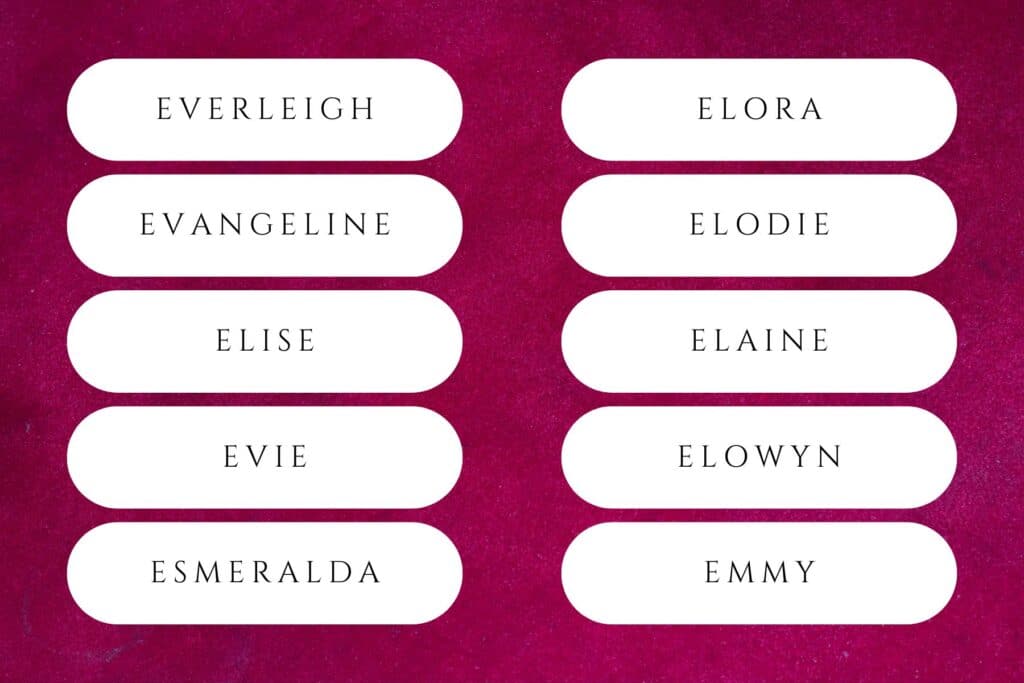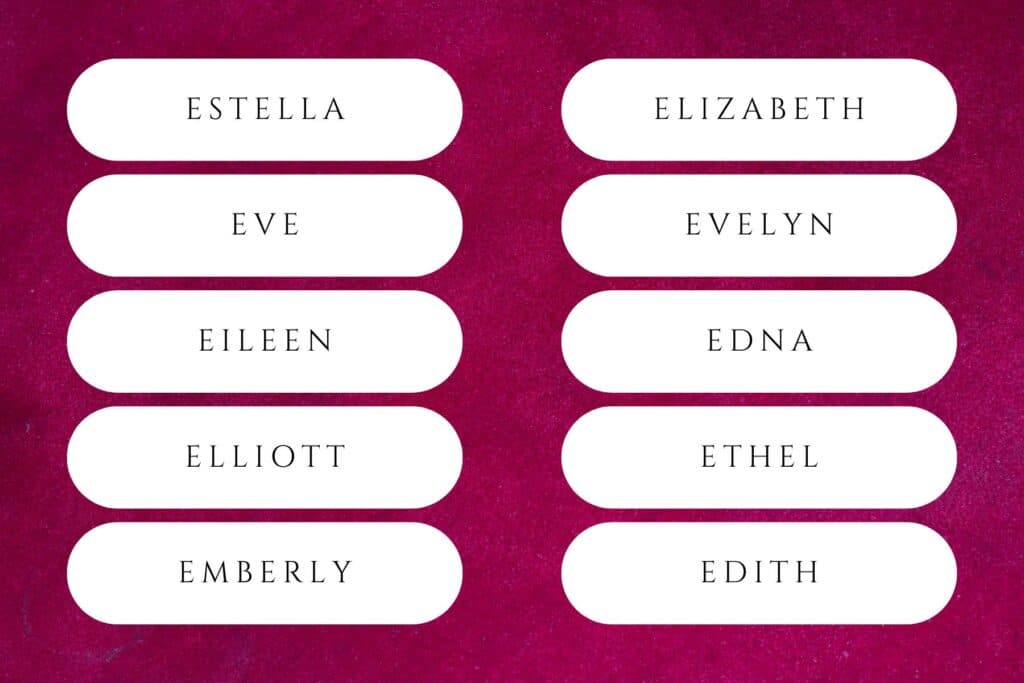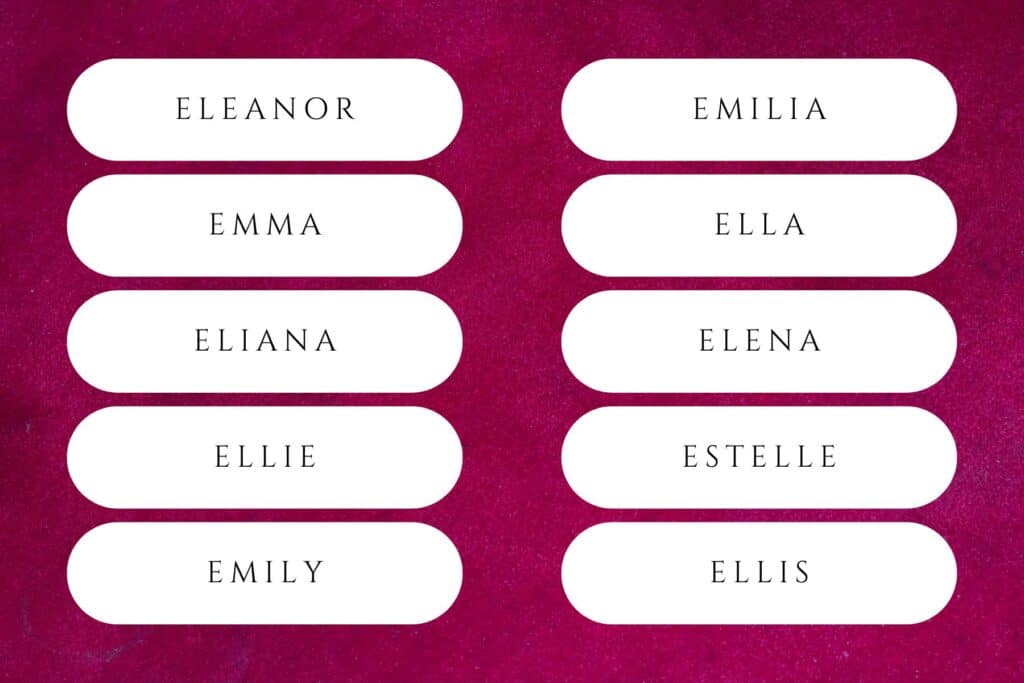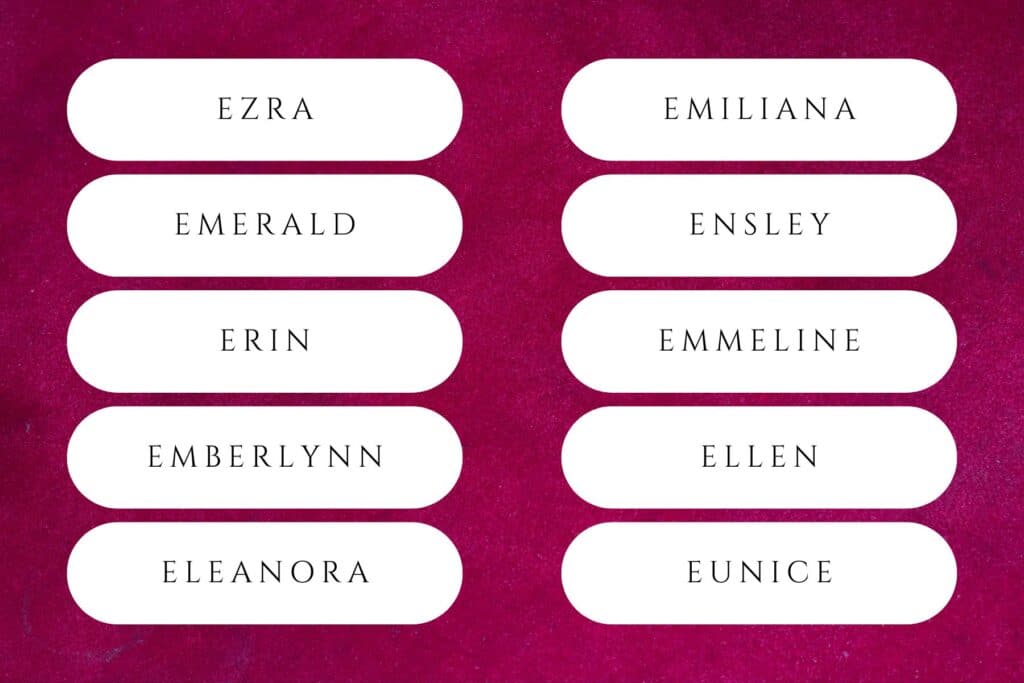“The nurse looked at me like I’d lost my mind.”
Girl names that start with E are just as popular today as they were in the early 1900s.
And that’s a good thing because the letter “e” was a top-two first initial for baby girls every year from 1880 to 1928 before falling out of the top-five in 1935 and top-10 in 1948, according to Behind the Name.
It didn’t re-enter the top-five until 2010, but has now been a top-two first initial every year since 2018.
RELATED: The Ultimate List of 4 Letter Names for Girls
Thanks to the U.S. Social Security Administration (SSA), we can see just how much girl names beginning with E have changed (and not changed) from their peak in the early 1900s to now, in the mid-2020s.
| Most popular baby girl names with E in 1910s | Most popular baby girl names with E in 2024 |
| 8. Elizabeth | 2. Emma |
| 12. Evelyn | 8. Evelyn |
| 19. Edna | 14. Eleanor |
| 22. Ethel | 17. Elizabeth |
| 30. Edith | 18. Eliana |
| 31. Eleanor | 21. Ellie |
| 36. Esther | 25. Emily |
| 41. Emma | 30. Ella |
| 46. Elsie | 43. Emilia |
| 53. Eva | 45. Elena |
Names like Emma, Evelyn, Eleanor and Elizabeth have withstood the test of time, each ranking inside the top-50 in the 1910s before jumping to the top-20 in 2024.
Edna and Ethel, which cracked the top-25 in the 1910s, haven’t appeared in the top-1,000 for decades.
And while Ethel, Edith, Esther, Elsie and Eva have seen significant drops in popularity over the past 100 years, they haven’t completely disappeared and have settled just outside of the top-100 in recent years.
Those names have now been replaced by modern favorites like Eliana, Ellie, Ella, Emilia and Elena.
As girl names starting with E continue to evolve, let’s take a look at some of the more elegant and ebullient options to consider for your daughter!

Eloise
Origin: French; Germanic
Meaning: Healthy and wide
Eloise, pronounced el-oh-WEEZ, is believed to come from the French name Héloïse and Germanic name Helewidis, which is composed of the Germanic elements heil, meaning “healthy,” and wit, meaning “wide.”
Emery
Origin: Norman French; Germanic
Meaning: Great ruler; Great king
Emery, pronounced EH-mur-ee, is the Norman French form of Emmerich, which is believed to be composed of the Germanic elements irmin, meaning “whole” or “great,” and rih, meaning “ruler” or “king.”
Eden
Origin: Biblical; Hebrew
Meaning: Pleasure; Delight; Garden of Eden
Eden, pronounced EE-din, comes directly from a place name in the Bible believed to derive from the Hebrew word eden, meaning “pleasure” or “delight.” The Garden of Eden is where Adam and Eve lived.
Everly
Origin: Old English
Meaning: Boar clearing; Forever
Everly, pronounced EH-vur-lee, originated as a surname composed of the Old English elements eofor, meaning “boar,” and leah, meaning “clearing.” It can also be an elaboration of the English word ever.
Eliza
Origin: Hebrew
Meaning: Oath to God; My God is an oath
Eliza, pronounced eh-LEE-zuh or ee-LYE-zuh, is a shortened form of Elizabeth and, ultimately, Elisheva, which is composed of the Hebrew elements el, referring to the Hebrew “God,” and shava, meaning “oath.”
Eva
Origin: Hebrew
Meaning: Breathing; Full of life
Eva, pronounced EE-vuh, is a variant of Eve, which comes from the Hebrew name Ḥawwa and derives from the Hebrew word hawa, meaning “to breathe,” or the Hebrew word haya, meaning “to live.”
Esther
Origin: Hebrew; Persian; Semitic Mythology
Meaning: Star; Evening star
Esther, pronounced EHS-ter, comes from the Hebrew name Ester, which is believed to mean “star” in Persian. It has also been linked to the name of the Near Eastern goddess Ishtar, meaning “evening star.”
Ember
Origin: Old English
Meaning: Small, live coal; Spark
Ember, pronounced EHM-bur, comes directly from the English word ember (derived from the Old English word æmerge), referring to “a small piece of burning or glowing coal or wood in a dying fire” or “ashes.”
Emersyn
Origin: English; Germanic
Meaning: Great ruler; Great king
Emersyn, pronounced EH-mur-sin or EH-mur-sun, is a variant of the patronymic name Emerson, meaning “son of Emery,” with Emery coming from the Germanic name Emmerich, meaning “great ruler.”
Elsie
Origin: Hebrew
Meaning: Oath to God; My God is an oath
Elsie, pronounced EL-see, is a diminutive of Elizabeth, which comes from the Hebrew name Elisheva and is composed of the Hebrew elements el, referring to the Hebrew God, and shava, meaning “oath.”

Everleigh
Origin: Old English
Meaning: Boar clearing; Forever
Everleigh, pronounced eh-vur-LEE or eh-vur-LAY, is a modern variation of Everly, which originated as a surname composed of the Old English elements eofor, meaning “boar,” and leah, meaning “clearing.”
Evangeline
Origin: Greek
Meaning: Bringer of good news
Evangeline, pronounced ih-VAHN-juh-leen or ee-VAN-juh-line, derives from the Greek word euangelos, meaning “to bring good news,” from the Greek words eu, meaning “good,” and angelma, meaning “news.”
Elise
Origin: Hebrew
Meaning: Oath to God; My God is an oath
Elise, pronounced el-EEZ or el-EES, is another shortened form of Elizabeth, which derives from the Hebrew name Elisheva and is composed of the elements el, meaning “God,” and shava, meaning “oath.”
Evie
Origin: Hebrew
Meaning: Breathing; Full of Life; Wished for; Little bird
Evie, pronounced EE-vee, is a variant of Eve, which derives from the Hebrew word hawa, meaning “to breathe,” or haya, meaning “to live.” It can also be a diminutive of Evelyn, meaning “wished for” or “little bird.”
Esmeralda
Origin: Spanish; Greek
Meaning: Emerald; May birthstone
Esmeralda, pronounced es-muh-RAHL-duh, comes directly from the Spanish word esmeralda and, ultimately, the Greek word smaragdos, meaning “emerald,” the traditional birthstone for the month of May.
Elora
Origin: Hebrew
Meaning: God’s light; Light of God; God is my light
Elora, pronounced ee-LOR-uh or uh-LOR-uh, is a combination of the Hebrew words el, meaning “God,” and or, meaning “light,” and is often linked to the Hebrew name Eliora, meaning “God is my light.”
Elodie
Origin: French; Gothic; Germanic
Meaning: Foreign riches; All the wealth
Elodie, pronounced el-oh-DEE, is the French form of Alodia, which is believed to be composed of the Gothic elements alls, meaning “all,” or aljis, meaning “foreign,” combined with auds, meaning “wealth.”
Elaine
Origin: Old French; Greek
Meaning: Torch; Corposant; Moon
Elaine, pronounced uh-LAYN or ee-LAYN, is an Old French form of Helen, which comes from the Greek word helene, meaning “torch” or “corposant.” It’s also linked to the Greek word selene, meaning “moon.”
Elowyn
Origin: Cornish
Meaning: Elm tree
Elowyn, pronounced EL-oh-win, is a variant of Elowen, which translates to “elm tree” in Cornish. The elm tree is significant in Celtic mythology, symbolizing strength, beauty and a passage to the Underworld.
Emmy
Origin: English; Germanic; Latin
Meaning: Whole; Great; Rival
Emmy, pronounced EH-mee, is a diminutive of Emma, which comes from the Germanic word irmin, meaning “whole” or “great.” It’s also commonly linked to Emily, meaning “rival” via Latin aemulus.

Estella
Origin: Latin
Meaning: Star
Estella, pronounced eh-STEL-uh, derives from the Latin word stella, meaning “star.” It was popularized in the United States by Estella Havisham, a character in Charles Dickens’ 1860 novel “Great Expectations.”
Eve
Origin: Hebrew
Meaning: Breathing; Full of life
Eve, pronounced EEV, comes from the Hebrew name Hawwa, which derives from the Hebrew words hawa, meaning “to breathe,” or haya, meaning “to live.” In the Bible, Eve is the first woman created by God.
Eileen
Origin: English; Irish
Meaning: Torch; Corposant; Desired; Birdlike
Eileen, pronounced EYE-leen or AY-leen, is the Anglicized form of the Irish name Eibhlín, which is either the Irish form of Helen, meaning “torch” or “corposant,” or Aveline, meaning “desired” or “birdlike.”
Elliott
Origin: English; Hebrew
Meaning: My God is Yahweh
Elliott, pronounced EL-ee-it, originated as a surname derived from the medieval name Elias, which comes from the name Elijah and is composed of the Hebrew elements el and yah, both of which mean “God.”
Emberly
Origin: English
Meaning: Ember clearing; Full of ember
Emberly, pronounced EM-bur-lee, is a combination of the name Ember, meaning “small, live coal” in English, with the Old English element leah, meaning “clearing.” It can also mean “full of ember.”
Elizabeth
Origin: Greek; Hebrew
Meaning: God’s oath, Oath to God
Elizabeth, pronounced ee-LIZ-uh-beth or uh-LIZ-uh-bith, comes from the Greek form of the Hebrew name Elisheva, which is composed of the Hebrew elements el, meaning “God,” and shava, meaning “oath.”
Evelyn
Origin: Unkown
Meaning: Wished for; Breathing lake
Evelyn, pronounced eh-vuh-LIN, comes from the Germanic name Avelina, but it can also be a combination of the names Eve, meaning “to breathe” or “to live,” and Lynn, meaning “lake.”
Edna
Origin: Hebrew
Meaning: To delight; Pleasure
Edna, pronounced ED-nuh, comes from the Hebrew word adan, meaning “to delight,” and is often translated as “pleasure.” It appears in the Bible, but didn’t grow popular in the U.S. until the late-1800s.
Ethel
Origin: Old English
Meaning: Noble
Ethel, pronounced EH-thuhl, is a shortened form of names beginning with the Old English element æðele, meaning “noble.” Some parents prefer to spell it Ethyl, while others prefer the elaborated version, Ethelyn.
Edith
Origin: Old English
Meaning: Prosperous in war; Rich in battle
Edith, pronounced EE-dith and also spelled Edythe, comes from the Old English name Eadgyð, which is composed of the Old English elements ead, meaning “wealth” or “fortune,” and guð, meaning “battle.”

Eleanor
Origin: French; Occitan
Meaning: The other Aenor
Eleanor, pronounced EL-uh-nor, comes from the French name Alienòr and, ultimately, the Occitan phrase alia Aenor, meaning “the other Aenor.” Eleanor of Aquitaine used it to distinguish herself from her mother, Aenor.
Emma
Origin: Germanic
Meaning: Whole; Great; Universal
Emma, pronounced EM-uh, comes from the Germanic element irmin, meaning “whole” or “great.” It was introduced to England by Emma of Normandy, who was the wife of both King Ethelred II and King Canute.
Eliana
Origin: Greek; Hebrew
Meaning: Bright light; My god has answered; God answered me
Eliana, pronounced el-ee-AH-nuh, is believed to be a variant of Elaine, meaning “bright light” in Greek, but can also derive from the Hebrew words el, meaning “God,” i, meaning “my,” and ana, meaning “to answer.”
Ellie
Origin: English; Greek
Meaning: Torch; Corposant; Bright light
Ellie, pronounced EL-ee, originated as a diminutive or nickname of names like Eleanor and Ellen, both of which are believed to derive from the Greek name Helen, meaning "torch, “corposant,” or "bright light."
Emily
Origin: English; Roman; Latin
Meaning: Rival
Emily, pronounced EM-uh-lee, is the English feminine form of the Roman family name Aemilius, which derives from the Latin word aemulus, meaning “rival.” Emily is the more popular way of spelling Emilia.
Emilia
Origin: English; Latin
Meaning: Rival
Emilia, pronounced eh-MEE-lee-uh, is the Anglicized feminine form of Aemilius, which derives from the Latin word aemulus, meaning “rival.” The name was popularized by a character in William Shakespeare’s “Othello.”
Ella
Origin: Spanish; Germanic
Meaning: She; Other
Ella, pronounced EL-lah, comes directly from the Spanish word ella, meaning “she,” but other theories link it to the Germanic element alles, meaning “other.” It’s also used as a diminutive of Eleanor and Ellen.
Elena
Origin: Greek
Meaning: Torch; Corposant
Elena, pronounced eh-LAY-nah or eh-LEE-nah, is a variant of Helen, which comes from the Greek word helene, meaning “torch” or “corposant.” In Greek mythology, Helen was the daughter of Zeus whose kidnapping caused the Trojan War.
Estelle
Origin: Old French; Latin
Meaning: Star
Estelle, pronounced eh-STEL, comes from an Old French name derived from the Latin word stella, meaning “star.” Estella and Stella are popular variants, while Essie has emerged as a common nickname.
Ellis
Origin: English; Hebrew; Welsh
Meaning: My God is Yahweh; Kind; Benevolent
Ellis, pronounced EL-iss, originated as a surname derived from Elias and Elijah, meaning “my God is Yahweh” in Hebrew. It can also come from the Welsh name Elisedd, meaning “kind” or “benevolent.”

Ezra
Origin: Hebrew
Meaning: Help; Aid
Ezra, pronounced EZ-ruh, comes directly from the Hebrew word ezra, meaning “help.” In the Bible, Ezra was a scribe and priest who led the Israelites back from Babylonian exile to restore Jewish law.
Emerald
Origin: English
Meaning: Green gemstone; May birthstone
Emerald, pronounced EH-mur-uhld, comes directly from the English word emerald, referring to the vibrant green to bluish-green gemstone that’s also the birthstone for May. It’s the English form of Esmeralda.
Erin
Origin: English; Irish Gaelic
Meaning: From Ireland, Of Irish descent
Erin, pronounced AIR-in, is the Anglicized form of Éireann, which is the genitive case of Éire, meaning “Ireland” in Irish Gaelic. Some parents prefer a more unique spelling, such as Arin, Eryn, Aryn or Erinn.
Emberlynn
Origin: Old English; Welsh
Meaning: Glowing ashes by the lake
Emberlynn, pronounced em-bur-LIN, is a combination of the name Ember, derived from the Old English word æmerge, meaning “spark, fire, burning wood,” and the Welsh element lynn, meaning “lake.”
Eleanora
Origin: French; Occitan
Meaning: The other Aenor
Eleanora, pronounced el-uh-NOR-uh or el-ee-uh-NOR-uh, is the Latinate form of Eleanor and is derived from the French name Alienòr, which comes from the French phrase alia Aenor, meaning “other Aenor.”
Emiliana
Origin: Spanish; Roman; Latin
Meaning: Rival
Emiliana, pronounced eh-MEE-lee-ah-nuh, is the feminine form of Emiliano, which is the Spanish and Portuguese form of the Roman name Aemilius, derived from the Latin word aemulus, meaning “rival.”
Ensley
Origin: Old English
Meaning: One’s own clearing; Private clearing
Ensley, pronounced ENS-lee, is a variant of Ainsley, which is composed of the Old English elements anne, meaning “alone” or ansetl, meaning “hermitage,” and leah, meaning “woodland” or “clearing.”
Emmeline
Origin: Old French; Germanic
Meaning: Unceasing; Vigorous
Emmeline, pronounced eh-muh-LEEN, comes from an Old French name Emeline, which is believed to be a diminutive of names starting with the Germanic element amal, meaning “unceasing” and “vigorous.” It can also be an elaborated form of Emma.
Ellen
Origin: French; Greek
Meaning: Other Aenor; Torch; Corposant
Ellen, pronounced EL-in, is believed to be a diminutive of Eleanor, meaning “other Aenor” in French, or Helen, meaning “torch” or “corposant” in Greek. Today, most parents prefer Ellie, Ella, Eliana or Eleanor.
Eunice
Origin: Latin; Greek
Meaning: Good victory
Eunice, pronounced YOO-niss or YOO-nees, is the Latinized form of Eunike, which is composed of the Greek elements eu, meaning “good,” and nike, meaning “victory.” Therefore, it means “good victory.”
Eula
Origin: Greek
Meaning: Sweetly-speaking; Good talk
Eula, pronounced YOO-luh, is a short form of Eulalia, which comes from the Greek eulalos, meaning “sweetly-speaking,” ultimately derived from the elements eu, meaning “good,” and laleo, meaning “to talk.”
Erma
Origin: Germanic
Meaning: Whole; Great
Erma, pronounced ER-muh, is a variant of Irma, which derives from the Old German element irmin, meaning “whole” or “great.” It comes from the same Old German root as names like Emma and Emery.
Don’t Limit Your Search to Girl Names That Start With E!

Baby girl names that start with E are all the rage today, but don’t stop your search there!
There are 25 other letters of the alphabet worth exploring when looking for baby girl names. And while names beginning with E are popular, they aren’t as popular as A names.
For reference, E names represented 8.89% of all names given to baby girls in 2024 — but A names accounted for more than 15%.
First initials M, S and L rounded out the top-five in 2024, according to Behind the Name.
ALSO ON MOD MOMS CLUB: 50+ Baby Names With a Hyphen for Your Little Girl
Your options are literally endless, but don’t worry — Mod Moms Club is here to help. If you need a little extra inspiration, you’re always welcome to use our baby name generator to help narrow your list down!












